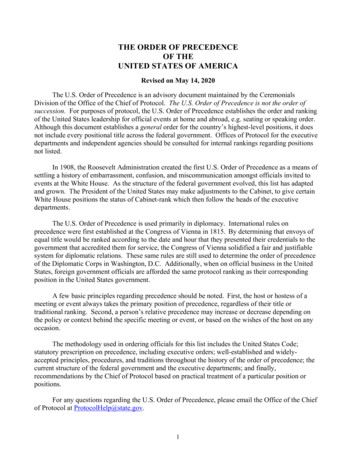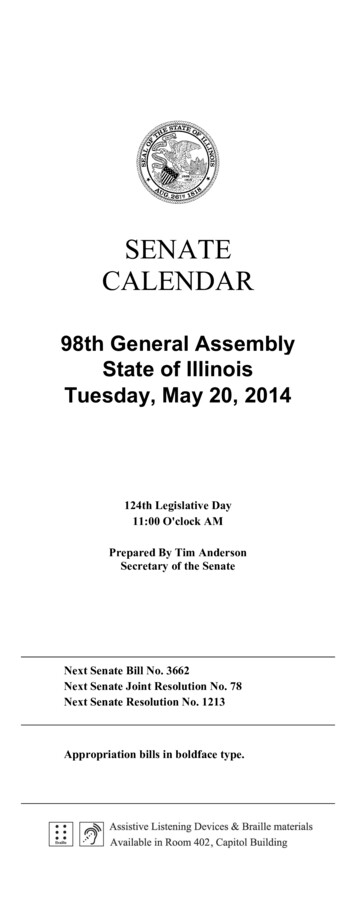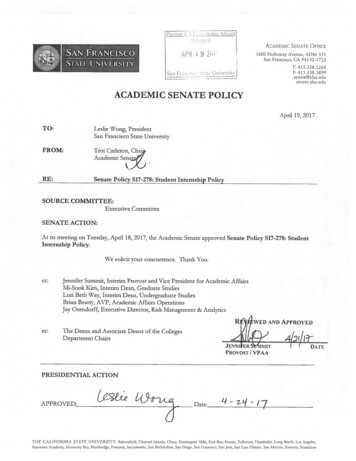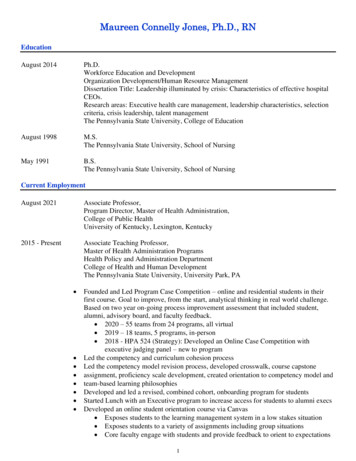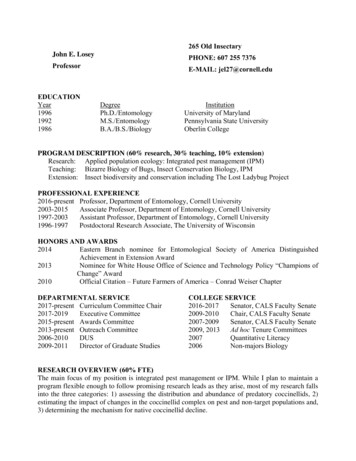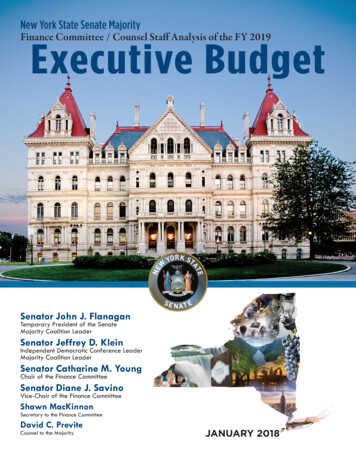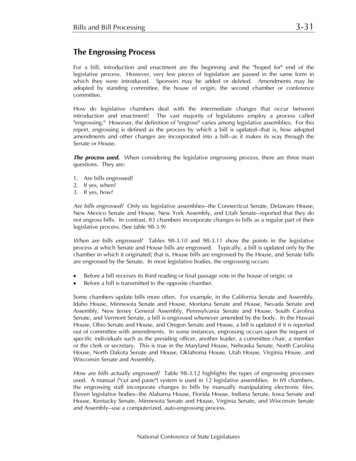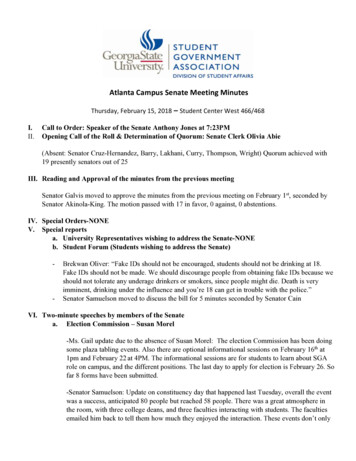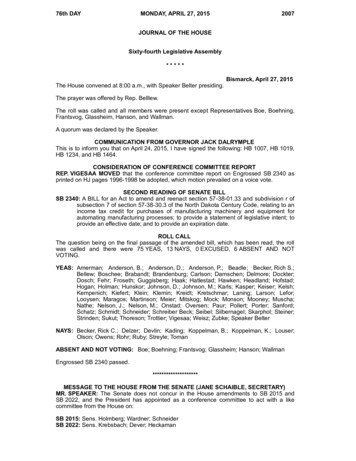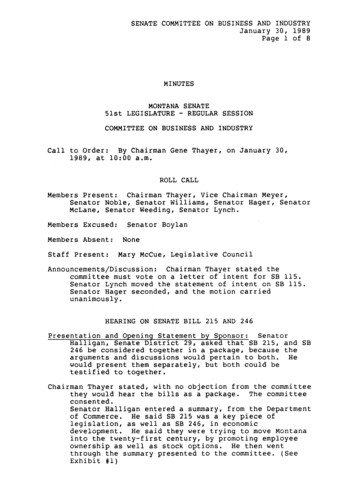
Transcription
SENATE COMMITTEE ON BUSINESS AND INDUSTRYJanuary 30, 1989Page 1 of 8MINUTESMONTANA SENATE51st LEGISLATURE - REGULAR SESSIONCOMMITTEE ON BUSINESS AND INDUSTRYCall to Order: By Chairman Gene Thayer, on January 30,1989, at 10:00 a.m.ROLL CALLMembers Present: Chairman Thayer, Vice Chairman Meyer,Senator Noble, Senator Williams, Senator Hager, SenatorMcLane, Senator Weeding, Senator Lynch.Members Excused:Members Absent:Staff Present:Senator BoylanNoneMary McCue, Legislative CouncilAnnouncements/Discussion: Chairman Thayer stated thecommittee must vote on a letter of intent for SB 115.Senator Lynch moved the statement of intent on SB 115.Senator Hager seconded, and the motion carriedunanimously.HEARING ON SENATE BILL 215 AND 246Presentation and Opening Statement by Sponsor: SenatorHalligan, Senate District 29, asked that SB 215, and SB246 be considered together in a package, because thearguments and discussions would pertain to both. Hewould present them separately, but both could betestified to together.Chairman Thayer stated, with no objection from the committeethey would hear the bills as a package. The committeeconsented.Senator Halligan entered a summary, from the Departmentof Commerce. He said SB 215 was a key piece oflegislation, as well as SB 246, in economicdevelopment. He said they were trying to move Montanainto the twenty-first century, by promoting employeeownership as well as stock options. He then wentthrough the summary presented to the committee. (SeeExhibit #1)
SENATE COMMITTEE ON BUSINESS AND INDUSTRYJanuary 30, 1989Page 2 of 8List of Testifying Proponents and What Group They Represent:Bob Hefner - Department of CommerceKathy Irigoin - State Auditor's OfficeList of Testifying Opponents and What Group They Represent:NoneTestimony:Bob Hefner said he would like to point out and emphasize,that both bills were administration bills, and werepart of the Governor's package, and were part of ourprevious Governor's package. They were bills thatwould cost very little, and made good sense.The bills declared a policy of support for employeeincentive, participation, and stock ownership plans;different ways of turning employees into businesspeople. The states existing business programs were tobe extended to employee owned companies. It furtherdirected the Department of Commerce to gather, and makeavailable information about incentive plans, to presentseminars, to provide training, and to report tolegislation on these subjects. It also set up a clearlegal framework for industrial cooperatives. He saidthat under employee owned business, over a ten yearperiod, the employee owner could build equity aboutthree times as fast as just working.He citedemployee ownership as broadening capital reinvestment,and keeping business in the state. (See Exhibit #4 & 5)He stated that since the committee only had two billsto hear, he would take them through the bills step bystep, explaining to them as they went.Kathy Irigoin said she was present mainly to answerquestions, but had a question. She asked if all of thesubsections in SB 215, relating to employee cooperativecorporations, would be void if SB 246 did not pass?She said she had a proposed amendment to make thechanges they felt necessary. (See Exhibit #2, & #3)Questions From Committee Members: Senator McLane asked, "IfSB 215, and SB 246 were in the statutes now, would thepeople operating the aluminum plant in Columbia Fallsbe getting more help than they are now? What is thedifference that this legislation would make?"Mr. Hefner said, "The plant at Columbia Falls was a
SENATE COMMITTEE ON BUSINESS AND INDUSTRYJanuary 30, 1989Page 3 of 8management buyout, a small group of managers whooperate the plant. It was not an employee ownershipwhere all the employees bought the stock. They rewardtheir employees, on the basis of the plant'sperformance, at the end of the year. Their structureis somewhat different than what is being discussedhere, and I think an ESOP might help them more. I'mnot aware of an employee owned and operated ESOPcorporation in Montana."Senator McLane asked, "If the employees want to buy thecompany, do they go to the bank and borrow the money?"Mr. Hefner replied, "An ESOP is a wonderful borrowingmechanism. It can allow refinancing andrecapitalization of major investments. If all theoutstanding stock were put into an ESOP plan, the ESOPcould in turn borrow the full value of the stockthrough a bank. The loan is then paid off throughcontributions to the pension plan through the years,with considerable tax savings."Senator Williams asked if the state would share in thecooperatives?Hefner said, "The state sets guidelines and framework, butdoesn't share ownership."Senator Williams "Who might be ready to utilize thisprogram? What can be expected to corne out of yourreport in a couple of years? Mr. Hefner said, "TheChampion Company is a real prospect . The cooperativecorporations law gives a ready made structure, andwould save time and money in forming a corporation.More than the Champion Company, there are thousands ofsmall businesses in the state of Montana who aren'taware of the E.S.O.P. structure, and what they couldgain from it."Senator Williams asked, "If the mechanics of SB 246 were setup to address the unclaimed dividends, or capitalcredits?" Mr. Hefner said liThe legislation sets up asystem specifically designed for that, called internalcapital account. At the end of the year, any moneyleft over can be distributed to the employee-owners."Senator Weeding asked, "When the employee-owned cooperativeis purchased, every owner starts with the same amountof equity and equal voting powers. As the planexpands, the higher paid employees gather equity in the
SENATE COMMITTEE ON BUSINESS AND INDUSTRYJanuary 30, 1989Page 4 of 8company faster than the lower paid employees.voting power, forever, stay equal?"Does theMr.Hefner said, "Yes, they all pay a membership fee to beginwith, approximately one years wages. That is just afee, they are not buying stock. Their share of profitsis the same percentage of total profits as their shareof earnings is of total earnings. The incentive isthere to encourage long productive hours. Theirearnings are greater, and so is their share of profits,but their votes remain equal.Senator Hager asked, "Are the taxes distributed to themembers on the same percentage?" Mr. Hefner said, "Theproperty taxes were paid by the company. Personal taxesare paid individually."Senator Hager asked, "Does the company keep the money andpay it out, as the earnings grow."Hefner said, "If the corporation provides for that, retainedearnings are retained, and the company issues capitalshares. The money would be used for company growth."Senator Hager said, "Then the company really is distributingtaxes to its' members, but they are receiving no actualcash to pay them." I am aware of a similar situationof employee ownership, and to receive their earningsthey have to buy the company. "I wonder if thiscooperative could work the same way."Hefner said, "Possibly, it could, but they do have an equalvote, and should be able to control those situations."Senator Hager asked, "Are the company losses distributedalso?"Mr. Hefner said, "They are exactly the same as profits."Chairman Thayer said, "It has been stated, the cost to theChamber would be nearly nothing. There obviously willbe a cost to have people out assisting, or willexisting staff handle it? I notice we don't have afiscal note with the bill."Hefner said "Small Business gives assistance to theDivision. Our responsibility is to help with economicdevelopment, so administration will decide what ourfocus will be. I think it would be normal businessassistance, and as for technical assistance, we wouldsend the information so there would be no direct cost."
SENATE COMMITTEE ON BUSINESS AND INDUSTRYJanuary 30, 1989Page 5 of 8Chairman Thayer asked, "What is the purpose of this bill, orboth of these bills? People can already form employeeowned stock companies under present law."Senator Halligan said, "The legislation provides a framework, offers technical assistance, and saves thousandsof dollars for the companies through their organizingprocess."Chairman Thayer asked, "Does the program just apply toemployee-owned ESOP's, or does also apply to ESOP planswhere the employer owns the majority?"Mr. Hefner said, "It would apply to both."Chairman Thayer asked, Why is the structure for co-opsneeded? Co-ops are already employee ownedorganizations now. What is the distinctivedifference?"Mr. Hefner said, "The employees of existing co-ops are notmembers, the people who purchase their products are.The benefits are distributed to the customers, not tothe employees. The industrial cooperative distributesthe benefits to its employees."Chairman Thayer said, "I can see that distinction, but ifthe benefits go to the employees, where do the patronsfit into the structure? Cooperatives are also for thebenefit of the patrons, are they not?"Mr. Hefner said, "The benefit to the patrons is in theproducts being offered at a more reasonable price,through the efficiency of the organization."Chairman Thayer asked, "Why call it a cooperative then?They can already organize cooperatives if they wantone?"Mary McCue said, "SB 215 has the provisions directing theChamber of Commerce to supply the service. If you lookat the definition of an employee-owned enterprise, itis the entity in SB 246, where the structure was setup. "Hefner said, "SB 215 gives direction to all forms ofemployment incentive plans, it doesn't try to set fortha statute toward the declaration of a business form."Senator Meyer stated, "SB 215 promotes the idea, and SB 246allows the mechanism to accomplish it."
SENATE COMMITTEE ON BUSINESS AND INDUSTRYJanuary 30, 1989Page 6 of 8Senator Halligan said, "The existing law allows cooperativeassociations, SB 246 would allow cooperativecorporations."Chairman Thayer said, "I still feel the word 'cooperative'is incorrect in the manner it is being used. If itsaid, the creation of an employee stock optioncorporation, it would track. I don't think you canhave a cooperative, in the sense of a cooperative thatdove-tails in with an ESOP."Hefner said, "The reason 'cooperative' was used because 'onemember, one vote' is used to define a cooperative. Thestructure would not be an ESOP, because the stock wasalready distributed to the members."Senator Lynch asked, "What about the effective date of July1. What was the reason for that?"Senator Halligan said "I think it was to fit the fiscal yearof local government, but I have no objection tochanging it to October."Senator Noble stated, "I think the tax structure of acooperative gives them an unfair advantages over theircompetition. I'm wondering if this legislation wouldencourage unfair competition to other type ofcorporations?"Mr. Hefner said, "It certainly would be competitive, but thestructure is available to everyone. The tax benefit isthe same as Sub Chapter 5 Corporations, although theinternal structures differ."Closing by Sponsor: Senator Halligan said, Privatebusiness has to be able to survive on its own. Ifconditions were such that the employee-ownership becamenecessary, the laws should be in the statutes. It is abusiness aid that could be capitalized upon in thestate of Montana. The banks are shutting downbusinesses which possibly could re-group under thisform of corporation, and keep more businesses inbusiness in our state.DISPOSITION OF SB 215 AND 246Executive Action will be taken at a later date.
SENATE COMMITTEE ON BUSINESS AND INDUSTRYJanuary 30, 1989Page 7 of 8DIPOSITION OF HOUSE BILL 150Discussion: Chairman Thayer said, Mr. Gene Phillips of theRecreational Vehicle Association, would like anopportunity to address the committee in opposition toHB 150. The committee gave their consent.Gene Phillips said, I am representing the RecreationalVehicle Industrial Association, which are themanufacturing companies that manufacture RVs . . andother pieces of equipment like that . . The RV dealersare a little different than the other entities your aretalking about, in the way that they operate. They havetwo trade shows, nation-wide, each year. They displaytheir various wares from those two hundred and somemanufacturers, most of which are small businessorganizations. At that time, they line up dealers tohandle their product. The dealers, apparently of tothese trade shows, for the purpose of lining up a goodmix of the different things they want . So they addand drop franchises on a regular basis . . They alsoindicate to me that the Rv components, there is nonecessity for a large parts inventory . . "Mr. Phillips said, "Most states do not have arequirement like that. There are some states that dorequire a buy back of the current year inventory, bythe manufacturer, if the manufacturer terminates thedealership."Mary McCue said, We talked about the effective date, and Idon't think we really need it to be immediatelyeffective. Do you remember what RepresentativeJohnson's felling were?"Senator Lynch said "His fear was that it might, in fact, byputting a later effective date, result in a great manypeople being terminated. Virtually, anycompany . . could eliminate all franchises . everybodywho presently has one would be stuck with their presentinventory."Mary McCue said, "That's right, you may want to leave thaton there. I think those bill should have a savingsclause on it. I think there are impairment ofcontracts issues that are resent. If you had a savingsclause, that would say this doesn't affect rights andduties that have matured, or proceedings that arealready begun before the effective date."
SENATE COMMITTEE ON BUSINESS AND INDUSTRYJanuary 30, 1989Page 8 of 8Senator Lynch said, lilt seems to me, if I read the titlecorrectly, that would be beyond the scope of the titlebecause we are simply adding additional categories to apresent law. By amending this from three years to oneyear, you would be affecting those already covered.In fact, you would change the bill considerably fromwhat the intent was." Mary McCue said, I think that'sright, as to these other people who are presentlycovered, that is a substantive change in their rights."Chairman Thayer asked, "If the committee thought it a goodidea to make it a one year buy back instead of three,just for these only, could you do that?"Mary McCue said it could be limited to the people listedwithin the bill as long as the existing law was notaltered without notification of those people who wouldbe affected.Senator Noble said he thought it was important thatbusinesses use discretion when purchasing products. Hesaid he felt a three year guaranteed buy back uponleaving the franchise would cover a dealer who did notdo any planning and he could send anything back that hedid not sell. He thought the concerns of boatmanufacturers should be studied further, some of theconcerns probably should be looked at also.Chairman Thayer expressed concern of allowing dealers toinitiate the buy back. He thought maybe there weresome unfair situations occurring, but did not want tosend bad signals to the business climate within thestate. Possibly, he said, it should be limited to themanufacturers initiation.Chairman Thayer suggested the bill be held for furtherstudy, and to allow Mary time to incorporate thesuggested changes.ADJOURNMENTAdjournment At: hairmanGT!CT
ROLL CALLBUSI N E S S &IN D U S T R Y COMMITTEEDATE51st LEGISLATIVE SESSIONNAMESENATOR DARRYL MEYERPRESENTSENATOR BOB WILLIAMS ,.,- SENATOR HARRY MC LANE SENATOR JOHN"J.D."LYNCHSENATOR GENE THAYEREach day attach to minutes.EXCUSED 'SENATOR TOM HAGERSENATOR CECIL WEEDINGABSENT SENATOR PAUL BOYLANSENATOR JERRY NOBLF. V--
SENATE BUSINESS & INDUSTRYEXHIBIT NO. --'\ \ \\-30-i,81U .2\5 -- .t4("DATE.Employee Ownership Opportunity ActSenate Bill 215andCooperative Corporations ActSenate Bill 246Senator Mike HalliganSponsorSummary of the LegislationACTION:Promotes and facilitates employee incentive plans,participatory management, employee stock ownership, andindustrial cooperatives.MEANS:-D claresa policy of support.I"(·ets the Department of Commerce to provideinfonn .1t ion, trCiining dnd technical assislance.-Dj-Exempts Employee Stock Ownership Plans (ESOPs) andcooperative corporation membership shares from statesecurities registrdtion.-Specifies a clear legal framework for organizingcooperative corporations.PURPOSE:-Increase industrial efficiency.-Stabilize employment . -Anchor CApital in the community.-Develop human resources:peclple.turn employees into businessCOST:Informdtion, training and technical assistance can beprovided withiu existing programs.Exemption of ESOPs fromsecurities reuistration, and ellactment of cooperative corporat.ionlaw will have no fiscal impact.No appropriation is required or requested.
Employee Ownership Opportunity ActSenate Ri]l 215andCooperative Corporations ActSenate Bill 246Senator Mike HalliganSponsorDescriptionThe Employee Ownership Opportunitv Act essentially does threethings:(1) declares an affirmative policy of support foremployee incerltive plans, participatory management and employeeownership, extending state business assistance programs to suchcompanies;( )simplifies the process of setting up employeeowned companies by exempting ESOP securities and coop membershipshar s[cunl sl tesecurities registration (federal law alreadyprovides for intense scrutiny of ESOPs);(3) directs theDep;-t r-tllll nt of f'ommerce to credLe and maintain a pool ofinformation about incentive plans, participatory management andemployee ownership; directs the Department to present seminarsZII1d provide m.:lIlagement training in these sUbject.s; and directsLhe Department to report to the legislature on accomplishing,these objectives.cle rThe Cooperative Corporations Act specifies alegal framework for organizing industrial cooperatives,wherein the employees (rather than customers or clients) are themembers and stockholders of the corporation.
Questions and Answers:Does this legislation force the creation of employee-owned firms?,\bsol utt:" J y not. The bi 11 s impl yt- IICOUrages employees, ownersdnd Illdlld'jcrs t o eXdmirle sever.l] '-'i,Lions through which they mayormay nl)l choose to implement enaplu}t.'e participation, incentive orownership plaIls. ESOP's offer several advantages to owners,including reduced-rate financing,improved employee productivityand the possi})ility of tax-free sale of the business to employeesupon retjremellt.Doesdcompany have to be on the verge of bankruptcy 1n order toallow an employee buy-out?No. In Lt(,t, most empJoyee participation plans are initiatedwith solvent, profitable businesses. Buyouts, while not precludedin b" rlkrupt.cy si tUd ti ons,ACl"(ISSUSUdlly occur in hea I thy bus inesses.the United Stutes, over 8,000 companies, emplol'ing about8,000,000 workers, have some form of employee ownership plan.Does this legislation promote a socialistic approach to businessTndivjdu . l share ownership and participation indecision-making are expressions of both democratic andcapiLd istic ideals. GovernnH::'rlt does nol fJarLicipale in any partof the actual decision-making process, dnd individual rights andincerllives are under the control of managers and employees, whodesj nthe type of participation they think best.lIas thistYPt Yes. Th, 'of leqislation worked elsewhere? .:tti. )n.:d Center for Employee Ownership in
Washington, D.C. tells us that more than 17 states have similarlegislation. Among the leaders in the field are; Massachusetts,Washington, Oregon, Illinois, Wisconsin, Iowa and California. Inevery case, employee ownership, when coupled with intelligent andprofessional management, has made improvements in profitabilityand productivity. In addition, many states have corporate lawswhich allow such employee participation and ownership, but whichare not recognized as "special legislation" to that effect.What examples can you give me that prove the efficiency of suchbusinesses?(1) The nlost exciting example from worldwide commerce is theMondragon Cooperative Complex in Mondragon, Spain. It began in1953, in a small town of about 14,000 people. After more than35 years, Mondragon has grown to a network of 110 cooperativefactories and supportive businesses that employ 20,000 people andannually do orle billion dollars business worldwide.(2) studies by the National Center for Employee Ownership,and by the u.s. General Accounting Office, demonstrate thatemployee stock ownership, when combined with participation inmanagement, yields efficiency gains in every kind of industry.(3) Examples 1n the United States include more than adozen lumber mills and plywood plants in Washington and Oregon,ESOP's like the Columbia Falls Aluminum Plant, and participatorymanagement companies such as Montana Rail Link and MontanaMineral Resources--all of which represent businesses of widely- 3 -
varied types with different types of employee participation andmanagement.Why can't businesses set up employee participation plans withoutthis bill? (and) Why can't employees start up cooperativeswithout this legislation?They can, but this bill makes it much easier, and itprovides both law and structure, as well as an informationnetwork to assist.Montana cannot afford to lose more jobs; thisbill simply gives government and the public more ways to savebusinesses, and to improve productivity and profits.Why the provision for "one employee, one vote?"Nothing in Senate Bill 215 or Senate Bill 246 imposes thattype of a structure, but if a one-to-one voting structure ischosen, each employee, whether labor or management, will have anequal voice in decisions affecting his or her life. A decision torelocate a facLory, for instance, might be a good idea for a fewpeople, but very bad for the majority. With a one-to-one votingstructure, no one could force the majority to move if they didn'twant to.What specific need does Senate Dill 246 address?S.B. 246 creates the necessary legal framework foremployee-owned, or cooperative corporations, and completesthe work done by S.B. 215. Current Montana law provides only aframework for farming and credit cooperatives and cooperative- 4 -
.associations, wherein the owner-members are those who receive theservices, rather than the empluyees of the business.- 5 -
SENATE BUSINESS & INDUSTRYEXHIBIT NO. .' '·-· 2.c;::oo.DATE.'-3D-g ,BIll NO. SJJ:2./ · 1;Kathy M. Irigoinstate Auditor's Office444-5236AMENDMENT TO SENATE BILL 2151. Page 4, line 17 through line 22, page 10.Strike: section 7 in its entiretyInsert: "Section 7. Section 30-10-105, MeA, is amended toread:If 30-10-105. Exempt transactions. Except as in this section expressly'provided, 30-10-201 through 30-10-207 shall not apply to any of the followingtransactions:(1) any non issuer isolated transaction, whether effected through a brokerdealer or not. A transaction is presumed to be isolated if it is one of not morethan three transactions during the prior 12-month period.(2) (a) any nonissuer distribution of an outstanding security by a brokerdealer registered pursuant to 30-10-201 if:(i) quotations for the securities to be offered or sold (or the securities.issuable upon exercise of any warrant or right to purchase or subscribe tosuch securities) are reported by the automated quotations system operated bythe national association of securities dealers, inc., (NASDAQ) or by any otherquotation system approved by the commissioner by rule; or(ii) the security has a fixed maturity or a fixed interest or dividend provi!lion and there has been no default during the current fiscal year or withinthe 3 preceding fiscal years, or during the existence of the issuer and anypredecessors if less than 3 years, in the payment of principal, interest, or dividends on the security.(b) The commissioner may by order deny or revoke the exemption specified in subsection (2)(a) with respect to a specific security. Upon the entryof such an order, the commissioner shall promptly notify all registered brokerdealers that it has been entered and of the reasons therefor and that within15 days of the receipt of a written request the matter will be set down forhearing. If no hearing is requested and none is ordered by the commissioner,the order will remain in effect until it is modified or vacated by the commissioner. If a hearing is requested or ordered, the commissioner, after notice ofand opportunity for hearing to all interested persons, may modify or vacatethe order or extend it until final determination. No order under this subsection may operate retroactively. No person may be considered to have violatedparts 1 through 3 of this chapter by reason of any offer or sale effected afterthe entry of an order under this subsection if he sustains the burden of proofthat he did not know and in the exercise of reasonable care could not haveknown of the order.(3) any nonissuer transaction effected by or through a registered brokerdealer pursuant to an unsolicited order or offer to buy, but the commissionermay require that the customer acknowledge upon a specified form that thesale was unsolicited and that a signed copy of each form be preserved by thebroker-dealer for a specified period;(4) any transaction between the issuer or other person on whose behalfthe offering is made and an underwriter or among underwriters;(5) any transaction by an executor, administrator, sheriff, marshal,receiver, trustee in bankruptcy, guardian, or conservator in the performanceof his official duties as such;
(6) any transaction executed by a bona fide pledgee without any purposeof evading parts 1 through 3 of this chapter;(7) any offer or sale to a bank, savings institution, trust company, insurance company, investment company as defined in the Investment CompanyAct of 1940, pension or profit-sharing trust, or other financial institution orinstitutional buyer, or to a broker-dealer, whether the purchaser is acting foritself or in some fiduciary capacity;(8) (a) any transaction pursuant to an offer made in this state directed bythe offeror to not more than 10 persons (other than those designated in subsection (7» during any period of 12 consecutive months, if:(i) the seller reasonably believes that all the buyers are purchasing forinvestment; and(ii) no commission or other remuneration is paid or given directly or indirectly for soliciting any prospective buyer; provided, however, that a commission may be paid to a registered broker-dealer if the securities involved areregistered with the United States securities and exchange commission underthe federal Securities Act of 1933, as amended.(b) For the purpose of the exemption provided for in subsection (8)(a), anoffer to sell is made in this state, whether or not the offeror or any of theofferees is then present in this state, if the offer either originates from thisstate or is directed by the .offeror to this state and received at the place towhich it is directed (or at any-post office in this state in the case of a mailedoffer).(9) any offer or sale of a preorganization certificate or subscription if:(a) no commission or other remuneration is paid or given directly or indirectly for soliciting any prospective subscriber;(b) the number of subscribers does not exceed 10; and(c) no payment is made by any subscriber;(10) any transaction pursuant to an offer to existing security holders of theissuer, including persons who at the time of the transaction are holders ofconvertible securities, nontransferable warrants, or transferable warrantsexercisable within not more than 90 days of their issuance, if:(a) no commission or other remuneration (other than a standby commission) is paid or given directly or indirectly for soliciting any security holderin this state; or(b) the issuer first files a notice specifying the terms of the offer and thecommissioner does not by order disallow either (a) or (b) of this subsection;(11) any offer (but not a sale) of a security for which registration statements have been filed under both parts 1 through 3 of this chapter and theSecurities Act of 1933 if no stop, refusal, denial, suspension, or revocationorder is in effect and no public proceeding or examination looking towardsuch an order is pending under either law;(12) any offer (but not a sale) of a security for which a registration statement has been filed under parts 1 through 3 of this chapter and the commissioner in his discretion does not disallow the offer in writing within 10 daysof such filing;(13) the issuance of any stock dividend, whether the corporation distributing the dividend is the issuer of the stock or not, if nothing of value isgiven by stockholders for the distribution other than the surrender of a rightto a cash dividend where the stockholder can elect to take a dividend in cashor stock;(14) any transaction incident to a right of conversion or a statutory or judicially approved reclassification, recapitalization, reorganization, quasireorganization, stock split, reverse stock split, merger, consolidation, or saleof assets;(15) any transaction in compliance with such rules as the commissioner inhis discretion may adopt to serve the purposes of 30-10-102. The commissioner may in his discretion require that 30-10-201 through 30-10-207 applyto any or all transactional exemptions adopted by rule.
(16) any transaction by a certified Montana capital company as defined in90-8-104, provided that such company first files all disclosure documents,along with a consent to service of process, with the commissioner. The commissioner may not charge a fee for the filing.(17) the sale of a commodity investment contract traded on a commoditiesexchange recognized by the commissioner at the time of sale;(18) transaction within the exclusive jurisdiction of the commodity futurestrading commission as granted under the Commodity Exchange Act;(19) a transaction that:(a) involves the purchase of o
HEARING ON SENATE BILL 215 AND 246 Presentation and Opening Statement by Sponsor: Senator Halligan, Senate District 29, asked that SB 215, and SB . fiscal note with the bill." Hefner said "Small Business gives assistance to the Division. Our responsibility is to help with economic development, so administration will decide what our .

